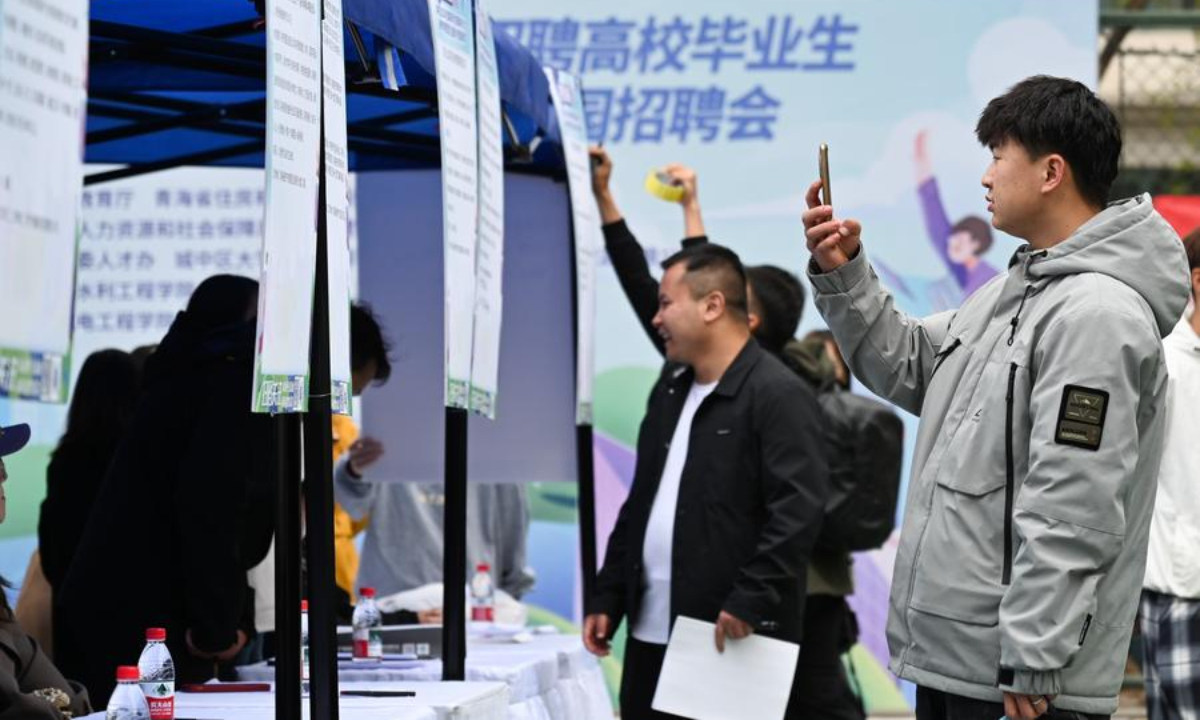
BEIJING – China's job market has remained stable, supported by government initiatives aimed at boosting employment for college graduates and helping businesses retain jobs amid global economic challenges and other headwinds.
On Friday, China unveiled a raft of measures on employment support for 2025 college graduates and the youth, according to a circular jointly issued by the Ministry of Human Resources and Social Security, the Ministry of Education, and the Ministry of Finance.
"College graduates and other youths are valuable human resources," said the circular, noting that every effort must be undertaken to provide them with employment support.
The circular stressed expanding employment opportunities through multiple channels, such as increasing market-driven job creation and stabilizing public-sector employment.
READ MORE: China announces new financial support for youth employment
Organizations that employ 2025 graduates, graduates unemployed within two years after leaving school, or registered unemployed youth aged 16-24 are eligible for a one-off job expansion subsidy, according to the circular. This policy remains effective until Dec 31, 2025.
The circular said that the one-off subsidy policy for state-owned enterprises hiring graduates will extend to Dec 31, 2026.
Pro-employment policies
In addition to pro-employment policies targeting college graduates, relevant authorities are fast-tracking the rollout of comprehensive measures to support business operations and ensure job stability amid mounting external pressures.
Authorities announced on Tuesday that China will extend key unemployment insurance policies through 2025 to help companies retain employees and support workers in upgrading their skills.
Until the end of 2025, companies that do not lay off employees or minimize layoffs will continue to receive refunds of a certain percentage of unemployment insurance premiums paid in the previous year, according to a circular, jointly issued by the Ministry of Human Resources and Social Security, the Ministry of Finance, and the State Taxation Administration.
The policy is part of broader efforts to help enterprises maintain stable employment.
The measures also ensure continued access to basic living allowances, including unemployment benefits, basic medical insurance, and support for older unemployed individuals.
ALSO READ: Xi prioritizes well-being of the people
"Employees are the company's most valuable asset," said Zhang Shili, principal of Changshu Lively Home Textile Co, Ltd in Suzhou, east China's Jiangsu province.
Across China, local governments are stepping up policy support, intensifying recruitment efforts, and expanding initiatives to stabilize and generate employment, implementing a range of practical measures and targeted services to steadily safeguard jobs and improve livelihoods.
Beijing is offering tax incentives to enterprises that hire individuals who have been unemployed for over six months or those lifted out of poverty.
In Sichuan, companies hiring new workforce entrants between April and September are eligible for a recruitment subsidy of 1,000 yuan (about $138) per employee.
Meanwhile, Chongqing plans to provide 10,000 free entrepreneurship spaces and fund 100 high-quality startup projects this year.
Approximately 190 million market entities in China play a crucial role in maintaining employment stability.
In the first quarter, steady consumption growth drove a significant rise in workforce demand within the consumer services sector. Data from Zhaopin.com shows that job openings in online life services, transportation and logistics, elderly care and nursing, and resident services increased by 43 percent, 35 percent, 17 percent, and 10 percent, respectively, compared to the previous year.
READ MORE: Job opportunities up for grabs in new year
Employment demand in emerging industries is surging. In the first quarter, corporate recruitment for mechanical engineers and automation engineers in industrial automation and related sectors increased by 40 percent and 10 percent, respectively, compared to the previous year.
Similarly, the demand for algorithm engineers and machine learning professionals rose by 44 percent and 18 percent, according to Zhaopin.com.
Career training
Chinese authorities are actively enhancing vocational skills training while refining program offerings to better align with industrial changes and societal needs.
"As industrial upgrading accelerates, corporate demands for workforce skills evolve. Only by improving workers' competencies and technical capabilities can the needs of industrial development be met," said Li Chang'an, a researcher with the Academy of China Open Economy Studies at the University of International Business and Economics.
Friday's circular said China also aims to train 1 million graduates and youths in 2025 to improve their employability.
It also stressed the need to strengthen employment services and create a favorable employment environment, including launching campaigns to rectify irregularities in the human resources market.
The human resources and social security department of Henan province recently unveiled a three-year action plan for "AI+" high-quality employment, designed to bridge talent gaps in the AI industry by enhancing training curricula.
From 2025 to 2027, the province aims to train over 50,000 individuals annually in AI applications, with plans to support at least 40,000 people in securing employment or pursuing entrepreneurship in AI-related fields.
Starting this year and continuing for three years, China's annual vocational skills training subsidies will benefit over 10 million trainees, with a focus on key areas such as healthcare, elderly and infant care, advanced manufacturing, modern services, and emerging professions.
China's government work report has set a target of creating over 12 million new urban jobs in 2025, with an aim to keep the surveyed urban unemployment rate around 5.5 percent for the year.
ALSO READ: China's job market remains stable in Q1
The country's surveyed urban unemployment rate was 5.3 percent in the first quarter and 5.2 percent in March, 0.2 percentage points lower than the previous month.
China will continuously enhance its policy toolkit to maintain employment stability and support economic growth, according to a meeting held on Friday by the Political Bureau of the Communist Party of China Central Committee to analyze and study the current economic situation and economic work.
The adopted policies should be implemented as quickly as possible, while additional policies in reserve should be swiftly introduced to respond to changes in the situation, according to the meeting.


